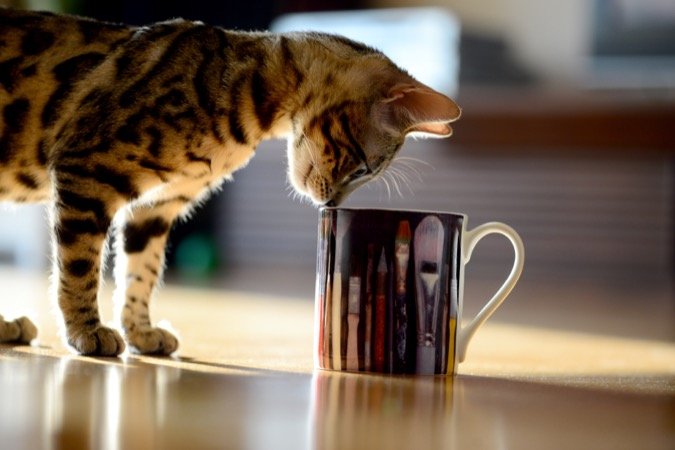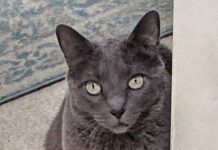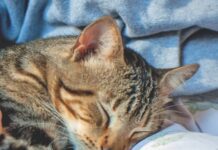While cats don’t have the reputation dogs do for finding lost strangers or detecting bombs, they do have a finely tuned sense of smell. That sense of smell is important to both their health and their happiness.
Cats have 200 million scent receptors in their nasal passages—people have about 5 million. The vomeronasal organ (sometimes called Jacobsen’s organ) on the roof of your cat’s mouth also aids in scent reception. If you see your cat curl his lip and lift his head while sniffing, that action helps to detect scent using this organ as well as through the nose.
Cats use their sense of smell to find prey (or the food bowl), to identify friend vs. foe, to find their way home, and to decide if they will eat something. A cat with a nasal infection or other nasal problems is not a happy cat.
While cats may lose vision and hearing with age, their sense of smell usually remains intact throughout life. Cats can develop temporary or permanent loss of smell from respiratory infections and permanent loss from trauma or cancer of the nasal structures. Cats with a permanent loss do adjust over time, but they may require some help to get them back on track.
Clearing the Nose
For the more common temporary loss of smell from a respiratory infection, you can help your cat. Anyone who has dealt with a severe respiratory infection in cats will have noted the heavy, yellowish nasal discharge many cats get. This thick discharge prevents your cat from smelling his food. Owners often report how difficult it is to get their sick cat to eat—even though they know how important nutrition is for an ill pet.
The first step is to clean the nose as frequently as you can. Use soft tissues or moisturized wipes to clean off any discharge and debris. If there are dried-on crusts, use a warm compress—like a warm, wet washcloth—and gently compress the nose briefly first to loosen up the hardened material, then wipe it away. If your cat is a tolerant kitty, you can try to gently suction some debris from her nose with an eye dropper.
Many cats benefit from spending some time in a steamed-up bathroom, such as when using a baby vaporizer. The warm, moist air will loosen secretions and help with crusts on the nose. Always watch your cat’s breathing, as the increased humidity may be too much for some very ill cats.
Back to Food
Once the nasal passages are as clean as you can get them, you should tempt your cat to eat and drink. This is when your creativity for smelly food choices is important.
@ ufokim|AdobeStock

Many a finicky sick cat has been encouraged to eat by using the juice from a can of tuna mixed with her regular diet or diluted with some water to drink. Almost any meat or fish choice that is warmed up will give off some strong odors. You want those odors to penetrate any internal debris and travel to the olfactory portion of the brain where scents are processed.
Warming foods slightly can increase their scent, but be careful not to heat foods to the point that they can burn your kitty’s mouth. Feel the food for heat before you actually feed it.
You will quickly learn your cat’s favorite food odors, but most often smelly fish will get a cat’s attention first.
– Without a good sense of smell, a cat is handicapped
– When she’s ill, use very smelly food to entice eating.
– A bit of tuna “juice” in a water bowl may get a sick cat to drink more water.
– Warm compresses can help keep the nose clear.



